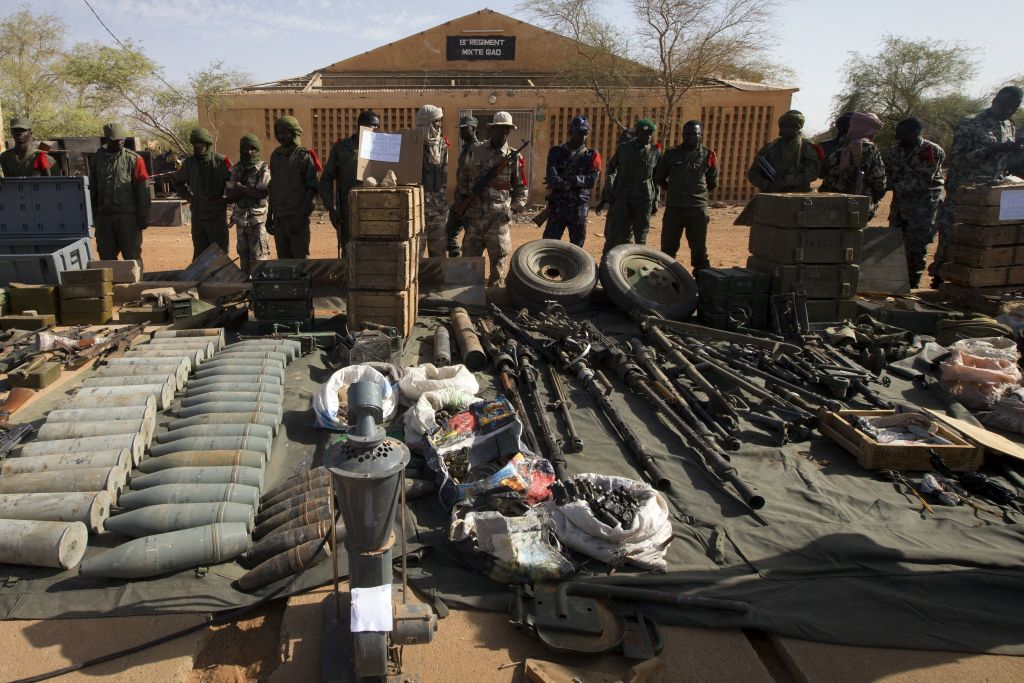Malian Capital Major Hub of Illegal Weapons Trade
ADF STAFF
More than a decade of violent conflicts in the Sahel has given rise to the thriving business of firearms trafficking, in which demand far outpaces supply.
With a 2022 population of 4.2 million, Mali’s capital city of Bamako is one of the primary centers for the illegal weapons trade.
Oluwole Ojewale, Central Africa regional coordinator for the South Africa-based Institute for Security Studies, authored a recent study that examined the causes of arms trafficking in Bamako.
“Arms are trafficked along the trans-Saharan route, which includes Libya, Algeria, Niger and Ménaka [in eastern] Mali,” he wrote in a February 18 article for The Conversation Africa magazine. “The arms finally reach Bamako and other conflict settings in west Africa through organized networks.”
Plentiful firearms helped to propel violence in 2022, which reached the highest levels ever recorded in Burkina Faso and Mali by the Armed Conflict Location & Event Data Project. The number of reported deaths from political violence increased 150% in Mali compared to 2021.
Official branches of al-Qaida and the Islamic State group drive much of the region’s hunger for guns, which make their way in large numbers to Tuareg separatists, self-defense militias and bandits.
“Many arms trafficking hubs in the Sahel rim borders or transportation routes where multiple criminal activities take place,” according to the United Nations Office on Drugs and Crime (UNODC). “Illegal markets — often hidden in plain sight in towns and villages along strategic corridors — lay unhampered by the presence of authorities.”
Libya has been a source of newly manufactured AK-pattern assault rifles since 2019. The UNODC says they are readily available in northern Mali’s black markets.
“Shoppers in Mali’s Gao, Timbuktu, and Ménaka regions can snap up AK-pattern assault rifles for $750 and cartridges for 70 cents apiece, from locally handcrafted pistols to smuggled French and Turkish machine guns,” the UNODC said in a 2022 threat assessment report entitled “Firearms Trafficking in the Sahel.”
Ojewale said a large number of illegal weapons in Bamako are manufactured in illegal workshops within the city.
“Nearly 80% of the weapons that have been seized come from these artisanal workshops, according to an official document I saw in Bamako,” he wrote. “The rugged geography of Bamako helps to conceal these factories, which are located in caves, behind hills and in ravines.”
Ojewale describes a city that has more than doubled in size between 2000 and 2015 and is full of abandoned buildings and unfinished construction in which criminals stockpile and traffic weapons.
“Sprawling slums are fast emerging within the city and becoming landscapes of protracted unrest, civil conflict, violent extremism and urban insurgency,” he wrote. “These four threats are fueled by mass unemployment, the drug trade and arms trafficking into the city.”
Bamako’s rapid growth attracts job seekers, but they outpace job creation. In Mali, 73% of workers are engaged in the informal economy, and youth unemployment is 32%. In 2021, the national poverty rate in Mali rose from 42.5% in 2019 to 44.8%.
Ojewale said his research has led him to believe that poverty and limited access to resources cultivate fertile ground for recruitment by extremist groups. He is calling on Malian authorities, civil society actors and Bamako residents to use an integrated approach.
“The authorities in Bamako must foster proactive policing of urban gangs and other local crime groups that drive local arms production and usage,” he wrote for The Conversation. “All gunsmiths should be formally registered so that it’s possible to track the scale, pattern and supply of arms production.
“Police must also build relationships with local communities. This will encourage information sharing and cooperation.”


Comments are closed.